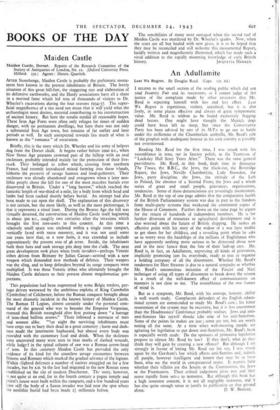An Adullamite
Lest We Regret. By Douglas Reed. (Cape. 12s. 6d.)
I BELONG to the small section of the reading public which did not read Insanity Fair and its successors, so I cannot judge of the justice of the complaint made by other reviewers that Mr. Reed is repeating himself with less and less effect. Lest We Regret is repetitious, violent, uncritical, but it is also lively, in some places effective and always of great symptomatic value. Mr. Reed is seldom to be found exclusively flogging dead horses. One might have thought the Munich dogs could have been left to sleep, but since the Conservative Party has been advised by one of its M.P.s to go out to battle under the oriflamme of the Chamberlain umbrella, Mr. Reed's role of the prophet with inadequate honour in his own country is possibly not overstressed.
Reading Mr. Reed for the first time, I was struck with his resemblance in tone, not in literary polish, to the Tennyson of " Locksley Hall Sixty Years After." There was the same general peevishness. Mr. Reed, in this book, finds time CO denounce The Times, the B.B.C., the Jews, the black-out, the Beveridge Report, the Jews, Neville Chamberlain, Lady Snowden, the Jews, party discipline, the Jews, the attitude of the Left to Poland, the absence of a Second Front, the Jews and a whole series of great and small people, grievances, organisations, tendencies. Some of these denunciations are revealingly inconsistent. Mr. Reed at the top of one page admits that the comparative health of the British Parliamentary system was due in part to the freedom from multi-party systems that weakened the continental copies of the House of Commons. Further down on the same page he argues for the return of hundreds of independent members. He is for further diversion of resources to agricultural development and is also worried about the future of British shipping. He makes an effective point with his story of the widow of a war hero unable to get shoes for her childred, and a revealing point when he asks us to worry over the hardships of the millions of Englishmen who have apparently nothing more serious to be distressed about now and in the near future than the fate of their laid-up cars. Mr. Reed is, in fact, an Adullamite, expressing all kinds of grievances, implicitly promising jam foi everybody, ready to join or organise a holding company of all the discontents. Whether Mr. Reed's tenderness for Herr Strasser is due to a natural sympathy or whether Mr. Reed's unconscious imitation of the Fascist and Nazi technique of using all types of discontent to break down the system is a result of the well-known effect of communications on manners is not clear to me. The resemblance of the two frames of mind is.
But as a symptom, Mr. Reed, with his courage, honesty, ability is well worth study. Complacent defenders of the English educa- tional system are commended to study Mr. Reed's case ; his bitter resentment of the system may be excessive, but it is less uncommon than the Headmasters' Conference probably realises. Jews and anti- anti-Semites like myself should take note of his anti-Semitism. Some of the points he makes are just ; some are not, but are worth noting all the same. At a time when well-meaning people are agitating for legislation to put down anti-Semitism, Mr. Reed's book is especially worth study. Do the sponsors of protective legislation propose to silence Mr. Reed by law? If they don't, what do they think they will gain by creating a new offence' But although I am strongly in favour of letting Mr. Reed say his say, I was struck again by the Gresham's law which affects anti-Semites and, indeed, all people, however intelligent and honest they may be or have been, who see the world in conspiratorial terms. It matters little whether their villains are the Jesuits or the Communists, the Jews or the Freemasons. Their critical judgement gives way and they move rapidly from sense to nonsense. But although this book has a high nonsense content, it is not all negligible nonsense, and it has also quite enough sense to justify its publication on that ground






















 Previous page
Previous page